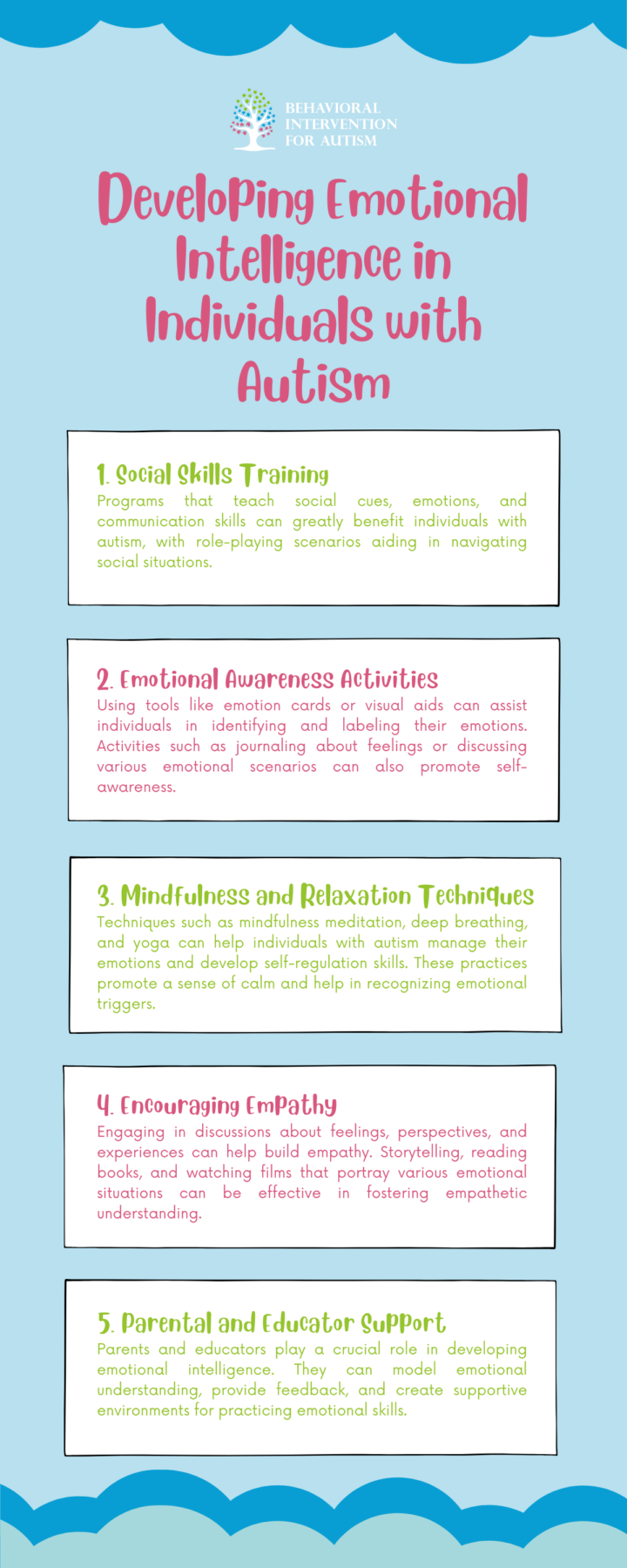
Table of Contents
Understanding emotional intelligence is crucial in the realm of autism, as it significantly impacts individuals on the spectrum. Research indicates that many autistic individuals exhibit lower levels of trait emotional intelligence, which can create challenges in areas such as the workplace. However, examining the distinct components of emotional intelligence presents a more nuanced view, suggesting that autistic adults may not face the same struggles in specific domains.
Understanding Trait Emotional Intelligence
People with Autism Spectrum Disorder (ASD) often face challenges in various facets of emotional intelligence, such as perceiving emotions from the environment and body language, utilizing emotions to connect with others, comprehending emotions based on contextual cues, and managing emotions both internally and externally. These difficulties can impact academic performance, even in individuals with intact cognitive intelligence.
Gender Discrepancies in Emotional Intelligence
In the realm of Asperger syndrome, gender distinctions in emotional intelligence have been noted. Men diagnosed with Asperger syndrome tend to exhibit higher scores on the Trait Emotional Intelligence Questionnaire (TEIQue) compared to women, albeit with modest effect sizes. This gender variation within autism spectrum disorders, particularly among higher-functioning individuals with ASD, sheds light on the diverse ways in which emotional intelligence manifests across different demographic groups.
Exploring the intricate relationship between autism and emotional intelligence provides valuable insights for parents and caregivers of individuals on the spectrum. By understanding the nuances of emotional intelligence in autism, one can better support and nurture the emotional development and well-being of those with ASD.
Challenges with Emotion Perception
Navigating the realm of emotions can be particularly demanding for individuals on the autism spectrum. Understanding and interpreting emotions, both within oneself and in others, present unique challenges that impact emotional intelligence. Let’s delve into the specific difficulties faced in identifying emotions and recognizing nonverbal emotional cues.
Difficulties with Identifying Emotions
Autistic individuals often encounter obstacles when it comes to identifying and articulating emotions, a condition known as alexithymia. This trait is characterized by challenges in recognizing and describing one’s own feelings. The ability to label and differentiate emotions, a fundamental aspect of emotional intelligence, can be impaired in those with Autism Spectrum Disorder (ASD). This difficulty can hinder social interactions and self-awareness, contributing to emotional dysregulation and communication barriers.
Recognizing Nonverbal Emotional Cues
Another significant challenge faced by individuals with ASD is recognizing nonverbal emotional cues exhibited by others. Nonverbal communication encompasses a wide range of signals, including facial expressions, tone of voice (prosody), gestures, and body language. Autistic individuals may struggle to interpret these cues accurately, leading to misunderstandings in social interactions and difficulties in forming and maintaining relationships. The nuances of nonverbal communication play a crucial role in emotional intelligence, and deficits in this area can impact the ability to empathize and connect with others effectively.
Understanding the intricacies of emotion perception challenges in autism is essential for parents and caregivers to provide targeted support and interventions that facilitate the development of emotional intelligence in individuals on the autism spectrum. By recognizing and addressing these hurdles, individuals with ASD can enhance their emotional awareness, communication skills, and social interactions, ultimately fostering a greater sense of emotional well-being and connection with the world around them.

Emotion Recognition in ASD
In the realm of Autism Spectrum Disorder (ASD), the ability to recognize emotions plays a crucial role in social interactions and daily functioning. Understanding how individuals with ASD perceive and interpret emotions is essential for caregivers and parents navigating the world of emotional intelligence within the autism community.
Recognition of Emotions from Facial Expressions
Individuals with ASD often face challenges in recognizing emotions from facial expressions, prosody, gestures, and body language. While some studies show no conclusive evidence of deficits in emotion recognition tasks, many individuals with ASD struggle to accurately interpret nonverbal cues, including facial expressions, which can impact their social interactions and relationships.
Challenges in Emotion Recognition Tasks
Children with ASD are known to employ less effective and adaptive emotion regulation strategies when encountering frustrating situations compared to their neurotypical peers. This disparity underscores the difficulties that individuals with ASD encounter in regulating their emotions and responding appropriately to social cues.
Furthermore, autistic individuals frequently experience challenges in perceiving emotions, including difficulty identifying and articulating their own emotions (alexithymia) and recognizing nonverbal emotional cues in others such as facial expressions, body language, and gestures. The lower Emotional Intelligence (EI) observed in individuals with ASD across various domains, including perceiving emotions from the environment, relating to others’ experiences through emotions, understanding emotions based on context, and managing emotions both internally and externally, can contribute to barriers in academic success, even when cognitive intelligence remains intact.
Recognizing and addressing challenges in emotion recognition and regulation allows caregivers and parents to provide essential support and interventions. This helps individuals with ASD navigate the complexities of emotional intelligence, enhancing their social interactions and overall well-being.
Developing Emotional Intelligence in Individuals with Autism
While challenges exist, it’s important to note that emotional intelligence can be developed and enhanced through targeted strategies:

Emotional intelligence is a crucial skill that can significantly impact the lives of individuals with autism. By recognizing the challenges they may face and providing targeted support, we can help enhance their emotional awareness and regulation. Developing emotional intelligence not only benefits individuals with autism but also enriches their relationships and overall quality of life, fostering a more inclusive and understanding society.
At Behavioral Intervention for Autism, we offer comprehensive ABA therapy in Florida that focus on enhancing emotional intelligence through tailored interventions. Our dedicated team is committed to providing high-quality, evidence-based strategies that support personal growth and social interaction. If you’re interested in discovering how our programs can make a positive impact, reach out to us today!
- 9 Common Obsessions of Children With Autism You Should Know - February 25, 2025
- What is Neurodiversity? A Guide to Embracing Differences - February 25, 2025
- Understanding Hyperfocus in Autism: What It Means and Why It Happens - February 25, 2025
